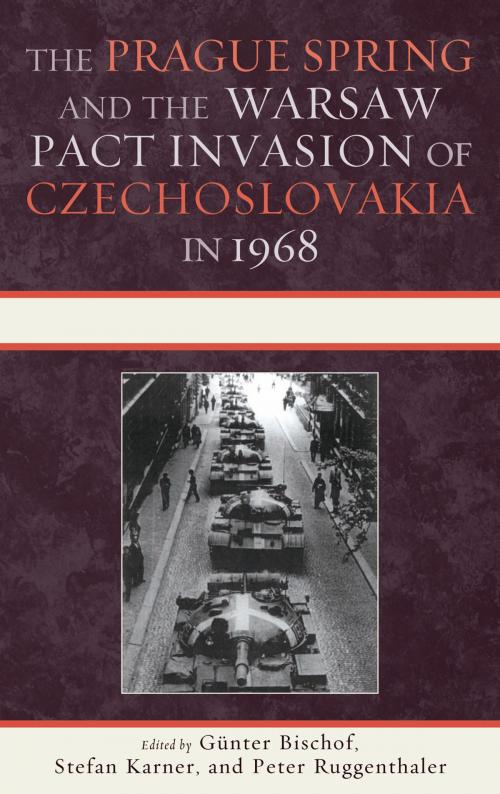The Prague Spring and the Warsaw Pact Invasion of Czechoslovakia in 1968
Nonfiction, History, Eastern Europe, Modern, 20th Century| Author: | ISBN: | 9780739143063 | |
| Publisher: | Lexington Books | Publication: | December 29, 2009 |
| Imprint: | Lexington Books | Language: | English |
| Author: | |
| ISBN: | 9780739143063 |
| Publisher: | Lexington Books |
| Publication: | December 29, 2009 |
| Imprint: | Lexington Books |
| Language: | English |
On August 20, 1968, tens of thousands of Soviet and East European ground and air forces moved into Czechoslovakia and occupied the country in an attempt to end the 'Prague Spring' reforms and restore an orthodox Communist regime. The leader of the Soviet Communist Party, Leonid Brezhnev, was initially reluctant to use military force and tried to pressure his counterpart in Czechoslovakia, Alexander Dubcek, to crack down. But during the summer of 1968, after several months of careful deliberations, the Soviet Politburo finally decide that military force was the only option left. A large invading force of Soviet, Polish, Hungarian, and Bulgarian troops received final orders to move into Czechoslovakia; within 24 hours they had established complete military control of Czechoslovakia, bringing an end to hopes for 'socialism with a human face.' Dubcek and most of the other Czechoslovak reformers were temporarily restored to power, but their role from late August 1968 through April 1969 was to reverse many of the reforms that had been adopted. In April 1969, Dubchek was forced to step down for good, bringing a final end to the Prague Spring. Soviet leaders justified the invasion of Czechoslovakia by claiming that 'the fate of any socialist country is the common affair of all socialist countries' and that the Soviet Union had both a 'right' and a 'sacred duty' to 'defend socialism' in Czechoslovakia. The invasion caused some divisions within the Communist world, but overall the use of large-scale force proved remarkably successful in achieving Soviet goals. The United States and its NATO allies protested but refrained from direct military action and covert operations to counter the Soviet-led incursion into Czechoslovakia. The essays of a dozen leading European and American Cold War historians analyze this turning point in the Cold War in light of new documentary evidence from the archives of two dozen countries and explain what happened behind the scenes. They also reassess the weak response of the United States and consider whether Washington might have given a 'green light,' if only inadvertently, to the Soviet Union prior to the invasion.
On August 20, 1968, tens of thousands of Soviet and East European ground and air forces moved into Czechoslovakia and occupied the country in an attempt to end the 'Prague Spring' reforms and restore an orthodox Communist regime. The leader of the Soviet Communist Party, Leonid Brezhnev, was initially reluctant to use military force and tried to pressure his counterpart in Czechoslovakia, Alexander Dubcek, to crack down. But during the summer of 1968, after several months of careful deliberations, the Soviet Politburo finally decide that military force was the only option left. A large invading force of Soviet, Polish, Hungarian, and Bulgarian troops received final orders to move into Czechoslovakia; within 24 hours they had established complete military control of Czechoslovakia, bringing an end to hopes for 'socialism with a human face.' Dubcek and most of the other Czechoslovak reformers were temporarily restored to power, but their role from late August 1968 through April 1969 was to reverse many of the reforms that had been adopted. In April 1969, Dubchek was forced to step down for good, bringing a final end to the Prague Spring. Soviet leaders justified the invasion of Czechoslovakia by claiming that 'the fate of any socialist country is the common affair of all socialist countries' and that the Soviet Union had both a 'right' and a 'sacred duty' to 'defend socialism' in Czechoslovakia. The invasion caused some divisions within the Communist world, but overall the use of large-scale force proved remarkably successful in achieving Soviet goals. The United States and its NATO allies protested but refrained from direct military action and covert operations to counter the Soviet-led incursion into Czechoslovakia. The essays of a dozen leading European and American Cold War historians analyze this turning point in the Cold War in light of new documentary evidence from the archives of two dozen countries and explain what happened behind the scenes. They also reassess the weak response of the United States and consider whether Washington might have given a 'green light,' if only inadvertently, to the Soviet Union prior to the invasion.















